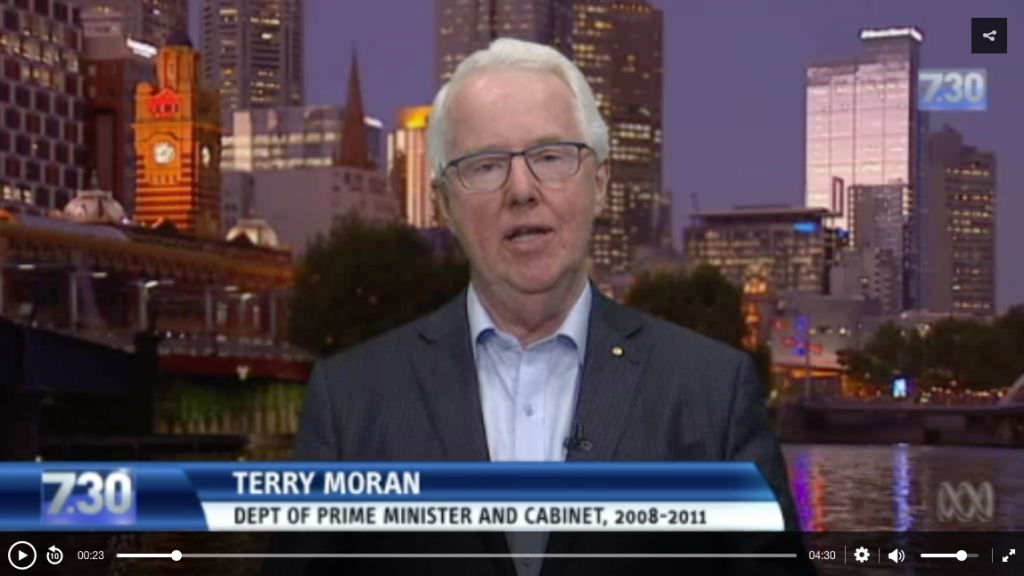TRANSCRIPT:
LEIGH SALES, PRESENTER: The Department of Prime Minister and Cabinet has now launched an urgent investigation into what happened. Terry Moran headed that department from 2008 to 2011, a period covered by these papers.
He joined me moments ago from Melbourne. Terry Moran, what’s your reaction to this huge security breach?
TERRY MORAN, DEPT OF PRIME MINISTER AND CABINET, 2008-2011: Great surprise, and it had to have come from somewhere within the public service because it spans governments of both sides.
And whoever was responsible for selling a couple of filing cabinets, which I think were locked, that must have been heavy with all the papers in them, without checking what was in the filing cabinets. Apart from anything else, you ought to be found and sacked.
LEIGH SALES: Is there any precedent for this sort of thing? Do people normally take it upon themselves to sell government furniture for example?
TERRY MORAN: Well, I can recall a few instances in the past where personnel files in filing cabinets have ended up on tips, but I’ve never heard of, as I think the ABC is putting it, thousands of pages of Cabinet documents being left in a filing cabinet and put out in this way.
LEIGH SALES: Well, you used to be the top public servant in Canberra as the head of the Department of Prime Minister and Cabinet. What would you do now if you were there running this place and this had happened on your watch?
TERRY MORAN: Well, sad I would to have to say Leigh, I’d ring up the ABC and ask for the Commonwealth property back.
But getting past that point, because it remains Commonwealth property. I would probably bring the AFP in to do a major investigation. And I can’t know what sort of documents they are. They might have numbers on them that would identify them in terms of the people who received them. And then, having got the investigation under way, if this hadn’t already happened recently, I would have hastened efforts to switch the Commonwealth entirely to a digital system for dispatching papers to Minister and authorised recipients.
LEIGH SALES: How difficult or otherwise do you think it will be for authorities to actually track down the path for these documents?
TERRY MORAN: If they are Cabinet documents they should have some identifier as to who it was intended would receive that particular copy of the document. But then if you work back from the sale records of whatever department disposed of the filing cabinet, you might also be able to find out who put the collection of papers together and failed to surrender them upon a change of government or a change of minister, as they’re supposed to do.
LEIGH SALES: These documents reveal some of the inner workings of governments that were in our quite recent past. The normal rule is that Cabinet documents are only released 20 years after the time that the events took place. Why is there that 20-year rule?
TERRY MORAN: Well, in Australia, our Cabinet system, and it’s similar in this respect to the British system, the Canadian system and the New Zealand system.
Our Cabinet system depends upon ministers around the table being able to have very frank conversations about what they think of particular proposals, sometimes disagreeing very strongly with each other about what should be done and if an insight into that free speech so to speak, at that level was available, that would inhibit the sort of discussion that good decision-making I think, actually requires.
LEIGH SALES: There is always a tension between the Government’s need for secrecy, as you just explained it, and the public’s right to know what their leaders do behind closed doors in their name. Where do you come down on the issue of the publication of this material?
TERRY MORAN: Well, I think John Faulkner’s reforms to shift us from 30 years to 20 years were a very, very good idea – although I was a bit cautious about them at the time – and having got there I think we should keep going.
Because I don’t think that there is any magic number about 20 years. Why not go to 15 over time? Secondly, there are many things that go into the Cabinet process. This is not in the national security area, it is not in economic policy, but mainly in spending areas, there are many things that are really little more than business cases or feasibility studies. And the quality of those documents should be tested by releasing them after the Government has made any decision it does make to go ahead with those initiatives.
And then people can say, “Oh, well now I understand what was intended with this particular piece of transport infrastructure”, for example.
LEIGH SALES: Terry Moran, many thanks for your insights this evening.
TERRY MORAN: Thanks Leigh.




